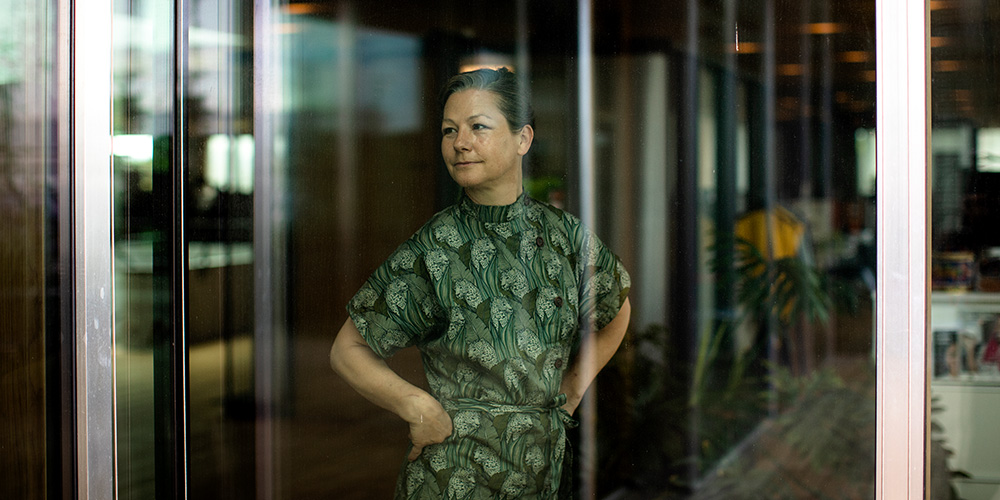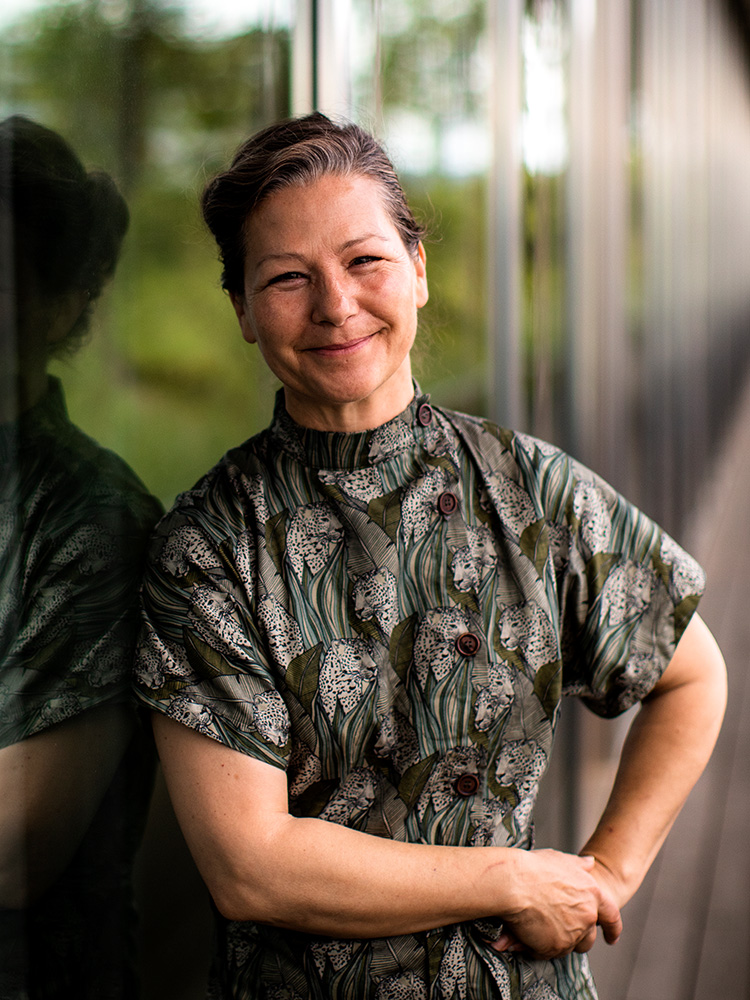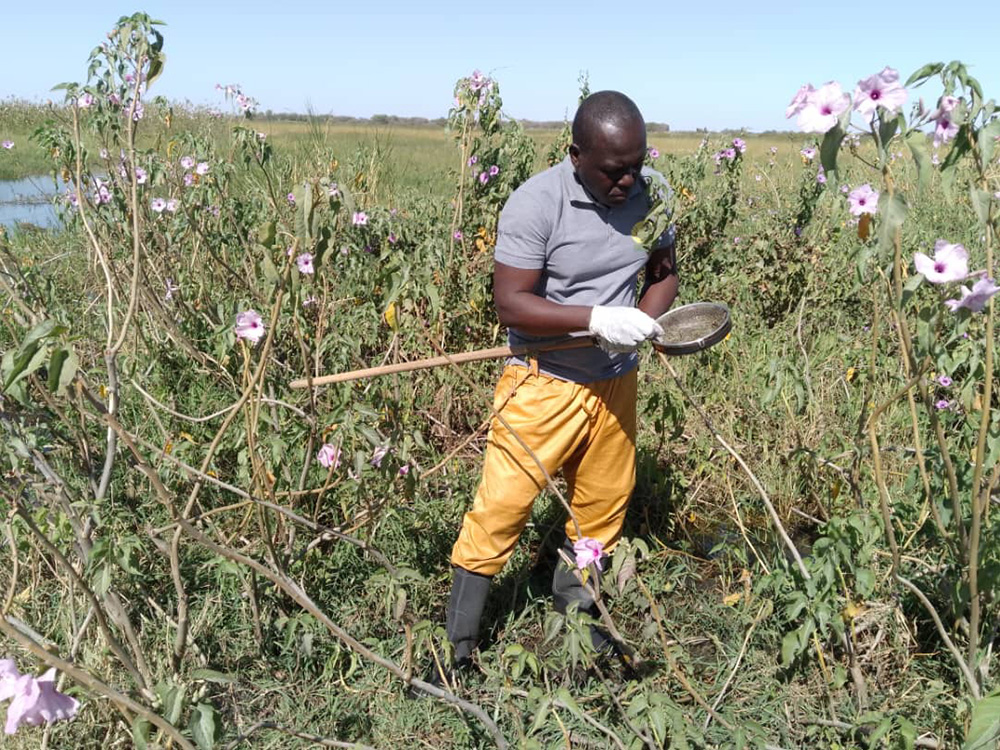In Focus: Helena Greter investigates parasites in snails, livestock and humans in the Sahel – and involves the population in interventions
The health of humans, animals and the environment are interconnected; this is the starting point of the One Health concept. This approach guides epidemiologist Helena Greter’s research in Chad. The aim: to provide the nomads living there and their cattle herds with access to medical care. The scientist arrived at biology – and finally at epidemiology – through art.
30 July 2024 | Noëmi Kern
Helena Greter has had an intense time of it. The epidemiologist at the Swiss Tropical and Public Health Institute (Swiss TPH) has just spent 10 days in Chad, taking stock at the halfway point of her two-year research project.
This project focuses on the health of people and animals in the Sahel, in line with the One Health approach, which recognizes that healthy people and a healthy environment are mutually dependent. “I was really fascinated by that right from the start,” says the 51-year-old.
Keeping an eye on local context
Her research in Chad focuses on the population around Lake Chad, including nomads and their animals as well as villagers. The water of the lake is fundamental for everyday life and is used for agriculture, livestock breeding, fishing and also as drinking water. But contact with the water can transmit parasites that make humans and animals sick. In humans, schistosomes, or blood flukes, trigger an infection in the intestinal or urinary tract: schistosomiasis. It is one of the neglected tropical diseases (NTDs) and can be fatal if left untreated. Animals can also be infested by schistosomes as well as Fasciola, or liver flukes. Infections cause the animals to lose weight, while milk volumes and fertility decrease. People depend on their animals for their livelihood. When they get sick, it has a devastating impact.
Although there are effective medications for treating the condition, these are usually inaccessible to those affected by these diseases. The correct use of medications is also a challenge, as they are often sold in markets without expert advice. This leads, for example, to active ingredients not being dosed correctly and therewith ineffective treatment or overdosing.
Helena Greter is therefore looking for ways to improve access to basic healthcare for the population groups around Lake Chad and their animals. “The health system in Chad is static, while these population groups are highly mobile,” she explains.
It will take dialog with the health authorities and other local organizations to raise awareness of this issue. So project development has to be participatory and actions implemented in collaboration with the local population wherever possible. This allows researchers to gain a better understanding of the various activities on the ground and derive potential interventions that fit the context. On top of that, acceptance of these interventions is greater when the people affected by them are involved from the outset. Because the problems are so varied, the research team is interdisciplinary; members include veterinary and human medicine specialists, biologists, social scientists and medical anthropologists.
Tracking the snails with a smartphone
Commenting on the background to the current project, Helena Greter says: “We now know a great deal about the epidemiology of blood and liver flukes in their end hosts, humans and animals. What we don’t have yet is an in-depth understanding of the parasites’ development in their intermediate hosts, the water snails.” It is still unclear which snail species are found in Lake Chad and how their populations develop over the seasons.
To get to the bottom of this, the researchers have launched a citizen science network in which participants search for, count and photograph snails at the water points in their village once a week – for a year. The researchers led by Helena Greter hope that this data will provide a better understanding of biological and ecological factors from which they can derive possible measures for snail control.
The benefits of citizen science networks like this are numerous. People are on site all the time and can observe exactly what is happening. At the same time, they act as multipliers by reporting to their community on their activities and the thinking behind them. “This makes for greater understanding, which in turn is important if an intervention is to succeed,” emphasizes Helena Greter, adding
that in the first six months of the year, a lot of data had already been collected. “The participants are very committed. They make a lot of observations and we regularly exchange with them to share initial insights into our data and discuss their experiences in the field,” says the researcher.
From dance to biology
Helena Greter did not embark on her career as a scientist until later in life. “Originally, I wanted to be an elementary school teacher, but after a year of training, I realized that it wasn’t for me,” she says. She decided on an apprenticeship as a potter and later studied fine arts. “To a certain extent, I was born with a flair for art and crafts. My mother is an artist, my father a painter,” she says. She lived for a year in Japan, where pottery has a long tradition, and there she developed an interest in movement and dance. “That’s how I finally got into biology; I was fascinated by how organisms that basically have the same blueprint move so differently,” she says.
Thanks to the University of Fribourg’s “Trente plus” program, she was able to complete a bachelor’s in biology at the age of 30, following it up with a master’s in ecology and evolution at the University of Bern. She completed her doctorate at the University of Basel under Jakob Zinsstag, a pioneer in the field of One Health. Since 2017, she has been working at the Swiss TPH at the Swiss Centre for International Health, where, in addition to her research projects, she also leads international consultancy mandates on clean drinking water and hygiene (WASH), NTDs, One Health and related topics.
Helena Greter visited Chad for the first time in 2010 – together with Jakob Zinsstag. The life of the nomads impressed her from the very beginning. It is in the nature of her curiosity that she gets to know different cultures and their realities. She is convinced that the different backgrounds and diversity of people drive research forward. For example, she would like to promote more international exchange. “In East Africa and the Indian Ocean, the One Health concept is already much more widespread than it is in Chad or Switzerland. The experience there could also help us move forward with implementation.”
In Focus: the University of Basel summer series
The In Focus series showcases young researchers who are playing an important role in furthering the university’s international reputation. Over the coming weeks, we will profile academics from different fields – a small representative sample of the 3,000+ doctoral students and postdocs at the University of Basel.




